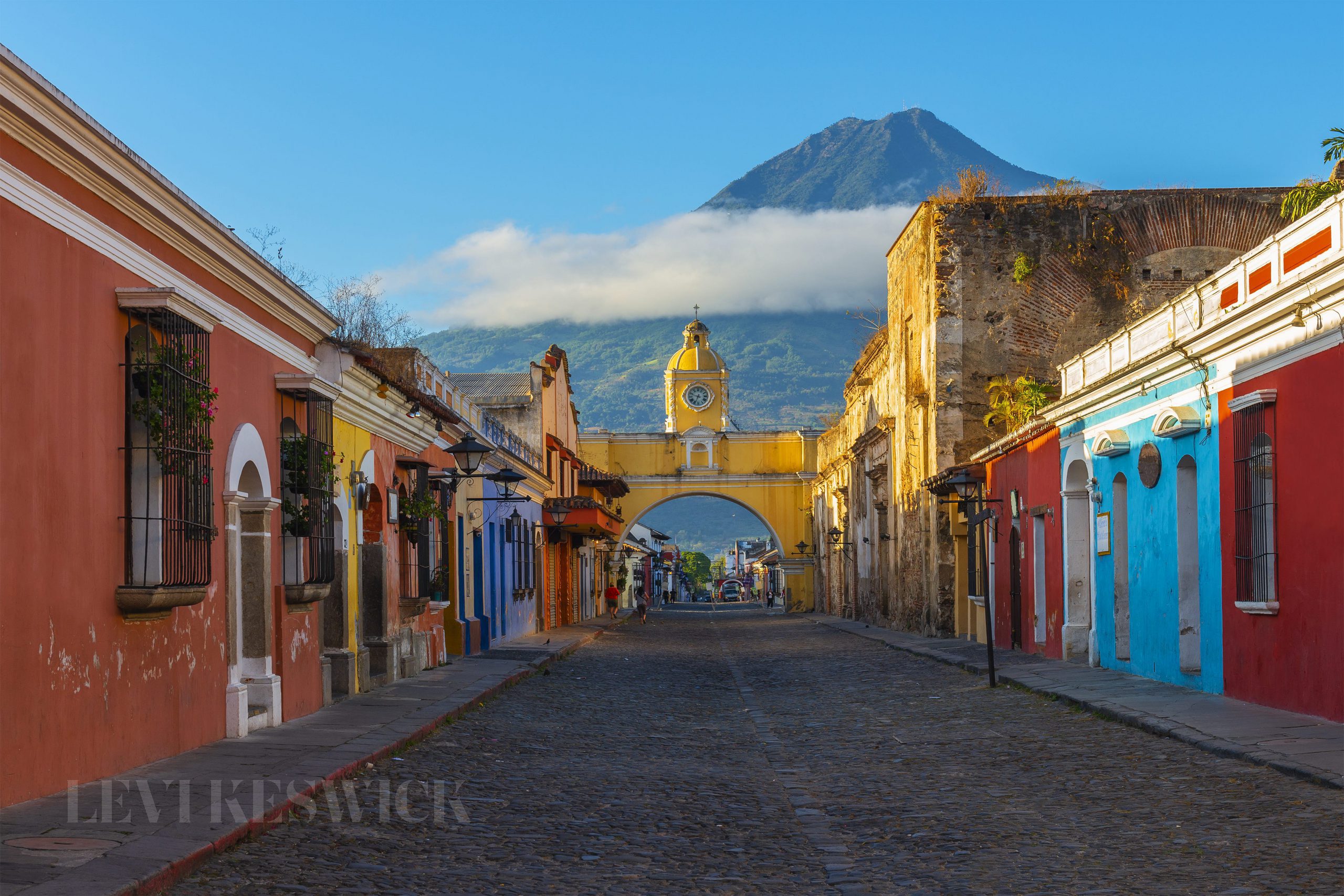With a population of 10 Million, Guatemala is the most populous country in Central America (excluding Mexico, which is considered part of North America). The ethnic composition consists of 45 percent Ladina (mestizo, which is Indian and European mixed), 45 percent Indian, 5 percent white, 2 percent black, with the remaining 3 percent to include a substantial Chinese population. The Republic of Guatemala has a unicameral legislative house, called the Congress of the Republic. The president is both chief of state and head of the government. Voting is compulsory for all literate persons over the age of eighteen. The economy is primarily agricultural with main crops (which are exported) are sugarcane, corn, bananas, coffee, beans, and livestock.
Expect Guatemalan business people to believe in the “prosperity theology” of some Neopentecostal sects. These sects preach that God wants people to be wealthy, and that peasants are poor because they lack faith. The majority of Guatemalan maquiladoras (manufacturing plants) are Asian-owned, which are primarily owned and managed by South Koreans.
Guatemala has three large Mayan groups; the Maya (Quiche, Kekchi, Kaqchikel, Tzutujil), the Ixil in the highlands of Guatemala, the Mam in the Western Highlands of Guatemala, and the Xinca, who inhabit the southeast of the country. These groups have their own languages and social stratification. Most of the textiles and precious metalwork of high quality are items made by these Indian people.
With respect to business attire, if the Guatemalan businessperson is old enough to have gone to a business college, which is very unlikely, then the most likely attire would be a tailored suit and tie or a well-tailored dress. If the person is young and new to the world of business, then sandals and shorts or slacks and shirt should work fine, from either the local store or the U.S. The Guatemalan businessperson will be glad to show you the inventory of the store. The businessperson can speak and understand English but will make a great show of switching to Spanish and will expect you to do the same.
Business cards printed in Spanish are the norm, even in English-speaking hotels. The most common business card is white and has the name printed in black, with the surname coming first, and if needed, an email address and/or telephone number. Where can you get this card? Not in Guatemala: they will be printed in Mexico or the U.S. If a business card is given to you in Guatemala and it is dark-colored, it is almost certainly homemade (referred to as maquiladora). Of course, you will want to open all business communication with your own name, as well as your affiliation with your U.S. company. What are the chances of these cards being recycled or of having your name on the card?
It is very common for the Guatemalan businessperson to refer to himself with the Spanish first-person pronoun “nosotros” or “nosotras”, meaning “ourselves” or “ourselves and you”. This is true even if you are an VIP in Guatemala. Don’t be surprised if the Guatemalan businessperson grabs a napkin and in swooping lettering writes, “And in the name of the Guatemalan Bankers’ Association, we would like to welcome you to Kuchitak, Guatemala,” to include the name of the town where the businessperson is based.
The biggest handicap in doing business in Guatemala is the level of illiteracy. Unlike most people in North America who cannot read, the illiterate Guatemalan is aware of his inability to understand or write a document. The second most common skill is writing (copiando) or copying, which is one of the most important skills in Guatemala, and is best accomplished during a personal meeting rather than on the written page. If you get a receipt written in a foreign language in Guatemala, remember that it may not be an accurate representation of what the document contains. If you are searching for a receipt, ask for the document in Spanish to be sure. Have the Guatemalan include, in writing, the penalties that are imposed of any errors are made in the document and insist that it is signed by them. And always remember the need for a trusted interpreter. Many of the movers and shakers in Guatemala have studied English, sometimes at a business school in Argentina or England, and these people will be your best contacts.
When it is time for a Guatemala businessperson to leave his office he will first inform everyone around him that he is leaving. He may refer to you as “nosotros”, or perhaps “usted” (depending on whether he wants you to leave or stay), and will encourage you to leave his office using any of the following idioms: “I have things to do, so …” or “I’ve got to leave.”
As he leaves the room, he will nod his head in a circular manner, but in a way that everyone will know he is really saying, “At your service,” or “I’m at your service.” He may also say, “I’m leaving now,” or “I have another appointment,” but it is a good idea to remind him that he cannot leave your company without your permission. And to keep everyone in the room you must not say, “Please don’t leave,” or “If you must leave.” Remember, he already told you he was leaving. Instead, say, “I need to discuss some issues with you that were brought up during the meeting” or “This vital matter must be discussed with all the officials in attendance.”
Be aware that it is quite common for the Guatemalan businessperson, especially in his home or in the office, to speak to persons with whom he has important relationships with in an informal manner. He may use the infinitives “tener que” or “deber tener” (literally to have to and should have to) and “tener que” (to have to). He may also use the infinitive phrase ” ir a hacer” (going to do) instead of the future tense as in “Voy a hacer”, I’m going to do it. For example, if the Guatemalan businessperson is going to take a trip to San Pedro, Laguna del Monte to see a maquiladora, he will tell you that he is going to send a letter to the maquiladora informing them of his intentions to visit them, along with the names of all those who are going with him.
He may also use the infinitive phrase “caer en la cuenta” (literally, to fall into the account) instead of “sabrá” (he/she will know). For instance, your Guatemalan businessperson may tell you, “El director de la maquiladora deber caer en la cuenta la semana próxima” (The maquiladora director should find out next week). In the case of a group of Guatemalan businesspeople, it is not unusual for one to tell another, “Ella deber caer en la cuenta que ellos no tienen ni idea” (She should find out that they really don’t know anything).
For a Guatemalan to have a failed business trip, it does not necessarily mean they cannot get more funding from their bank. They will tell you they failed, and then immediately follow it with, “What else could we do?” If the person says, “He oído que…” (I have heard that…) it will most likely be a rumor, not the gospel truth, and you must remember that and treat it accordingly.
If the Guatemalan needs to be convinced of something, he will use the formula “Hacer falta que…” as in, “Hago falta que le enviemos información sobre nuestra empresa.” (I should send you information about our company.) If there are several people present who are important to the Guatemalan, he may say, “Para mí es importante que usted conozca,” or “Sabe que es una gran persona” (He knows he’s a great man).
For the Guatemalan to be late for a business meeting or otherwise be distracted, he may say, “Apenas estoy descansando,” meaning, “I’m already resting.” If he opens a letter and is unable to immediately handle it, it may be because part of the information is confidential or it is material he has not seen before and he could not find anyone to help him with it. At these times, the Guatemalan may try to shift the blame by saying, “El correo siempre está malo” (The Post Office is always bad) or “El ministerio cerró el día” (The Ministry of Finance didn’t work today).
When a phone call from a foreign company is transferred to the office of a businessperson, he will invariably say, “Le paso al señor” (I will transfer the call to the gentleman). He may also say, “Le paso la oficina del señor” (I’ll transfer his office) or “Le paso, la oficina” (I’ll transfer the office). If the Guatemalan makes a phone call and the person does not answer, he may just hang up the phone without saying anything out loud but he will silently tell you, “I left a message.”
Business Negotiations & Contracts
When a Guatemalan refers to “estar furioso” (to be furious) or “acabar al otro” (ending the other) he is not referring to what is considered normal behavior in a United States business negotiation, where would-be partners or adversaries are often asked to leave the room. One or the other member of the negotiation team may leave the room when he or she becomes upset by the actions of the other party or their hostile attitudes. In Guatemala, where everything is friendly, even the nastiest negotiations are conducted with exciting smiles and hugs.
It is just as common for someone who has just been fired to leave with smiles and hugs. If a Guatemalan takes pride in being a hard worker, he may say, “Llevar grupo” (Lead a group).
Etiquette
Guatemalan businesspeople believe it is rude to leave a group of people, especially those who are helping them, in order to return home. This means a person who is invited to come to a party with several of his friends will not leave until the last of his “fellows” is ready to leave. It is common for all of them to arrive together and leave together. This can be particularly frustrating to an American who decides to leave as soon as the party breaks up, but the Guatemalan will remain. If he becomes too drunk to drive, he will ask you or another colleague to drive him home. And the best thing is not to try to convince him to leave, but just to let him take another drink.
A Guatemalan businessperson will first ask everyone present if they know someone, then proceed to ask the person the following: “¿Cómo, cómo está?” (How’s it going?) To show respect, Guatemalan men will often remove their suit jackets or sports coats when meeting someone who is superior in rank to them.
A common male greeting in Guatemala is “Somos la misma cosa” (We are the same thing). In some areas of the country, when the woman greets her husband, she may say, “¿Viste lo que traje?” (Did you see what I brought?)
Presentations
It is not uncommon for the Guatemalan to begin his presentation by apologizing for its rough quality, then immediately begin talking about the company being represented. He will most likely refer to the company as either its Spanish or English name, which should be taken as a warm sign that he both knows and respects that company. In some presentations, he will ask the person who is arranging the meeting to make an introduction or to introduce him. It is also not uncommon for the Guatemalan to refer to “la empresa que va a presentar” (the company that is going to be presented).
In most presentations, the Guatemalan will talk about the number of the customer or client or some relationship with the company, such as how long the two have known each other. You may be surprised to learn that he knows more about the specialty of his company than the person with whom he is negotiating.
NEGOTIATING
Negotiating can be an exciting part of the Guatemalan’s workday. Remember, the Guatemalan knows what is right and what is wrong. He has feelings about people who act improperly, and he will not hesitate to tell his side of the story. When Guatemalans are negotiating, they have present a posture of aggressiveness. When they are attending a meeting during which someone is talking, they will be silent. When they are within arm’s reach of each other, they will shake hands. If you have to tell the Guatemalan that something is confidential, he will remember it until the day he dies. If you value something, don’t expect the Guatemalan to tell anyone about it, especially if you tell him it is confidential. You may be surprised that the person will act as if he does not understand what you are talking about.
Throughout the negotiating process, the Guatemalan will make seemingly meaningless statements like, “Dilo de nuevo” (Say it again), in order to “relax” the person with whom he is negotiating. You should be silent and let him continue to speak, even if it means he talks for an hour or two. In Guatemala, silence is not considered poor judgment or coolness.
HANDLING A POSSIBLE BRIBE
Early in the year 2000, a friend of mine with the Guatemalan bank Banrural came to lunch and told me that the bank had been asked to pay a $100,000 bribe to a Guatemalan municipal government official in order to get a housing loan for a multinational company in the same town.
“Why are they going to pay a bribe to get the loan in the first place when they already have an agreement with the local government to build the company’s factory?” I asked.
“The official of the municipality says, ‘You need to give me some money because if you don’t, I will give the project to a different company,'” replied my friend.
“Don’t they have a budget for this project already?” I asked. “Don’t they have the money in hand, as they are required by law to do?”
“Yes, they have it, but they say that they don’t have enough to complete the project,” he said. “They say they need more money.”
“Why can’t they just put off the bribe payment until they complete the project?” I asked.
“They say they need the bribe right now for political reasons,” replied my friend. “The official who is asking for the bribe claims that he can get more money from the government and that he wants to be able to show the mayor of the city that he is able to get more money.”
“So, they’re willing to pay for the privilege of doing business in a town?” I asked.
“That’s what they say,” replied my friend. “They say it’s merely a way of doing business.”
“Did they tell the guy that they’ve already given the money?” I asked.
“No,” he said, “they said they didn’t have time to go into it.”
“How do you know all this?” I asked.
“The person who gave me this information was an executive VP of Banrural and a friend of the people at the company who went for the initial meeting in this municipality,” he replied.
“Do you think it’s a good thing that bribes can be bargained for in the marketplace?” I asked.
“Not at all. I’m just reporting what happened,” he replied.
“Was the company paying the bribe in dollars or Guatemalan currency?” I asked.
“It was in dollars,” he replied.
I figured that the company should have asked to see the budget before agreeing to go for the bribe, should have asked to see the municipality’s budget. If they look at the budget, they will see that they’re being forced to pay for something that every other company that has a factory in the city is also paying.
Another rule of thumb is to be sure you have an official copy of the municipality’s budget, something the municipal government can’t get its hands on so easily. If they’ll show you the budget, they’re in compliance with the law. If they won’t show you the budget, you know that something is up.
“GIVE ME A MILLION”
Please keep in mind when negotiating with a Guatemalan that you will never hear a figure in the millions or even the hundreds of thousands. Guatemalans are used to thinking in terms of thousands and tens of thousands. You may hear a commented such as, “Necesito un millón” (I need a million), and that should be seen as a good sign. The Guatemalan has just stated that he is looking for a million dollars, and that is great news if you can deliver it.
There are plenty of other ways that Guatemalans will favorably reveal to you the size of their mission. For example, when looking for a new car, they may say, “Quiero un Mercedes Benz CL500” (I want a Mercedes Benz CL500), or “Quiero un Lincoln Navigator,” without really thinking about what they’re saying. These comments are telling you they want a vehicle worth $50,000 to $60,000.
Business Etiquette In Guatemala: Conclusion
Remember, the above is just a cursory look at what you can expect when negotiating in Guatemala.
Keep in mind that each contract you sign in Guatemala will be a unique one-of-a-kind document that is at the mercy of the Constitution of Guatemala, and as such will be subject to constant interpretation, re-interpretation, and re-interpretation of that interpretation over the years. If you expect to be doing business in Guatemala for a long time, be sure you hire someone experienced in the laws of Guatemala to craft your contracts and lobby for you on your behalf.
It is important to know that Guatemala considers you the party that wants to give it money, while the Guatemalan wants to take your money. By following the tips in this article, you can make your interactions with a Guatemalan more civilized.








